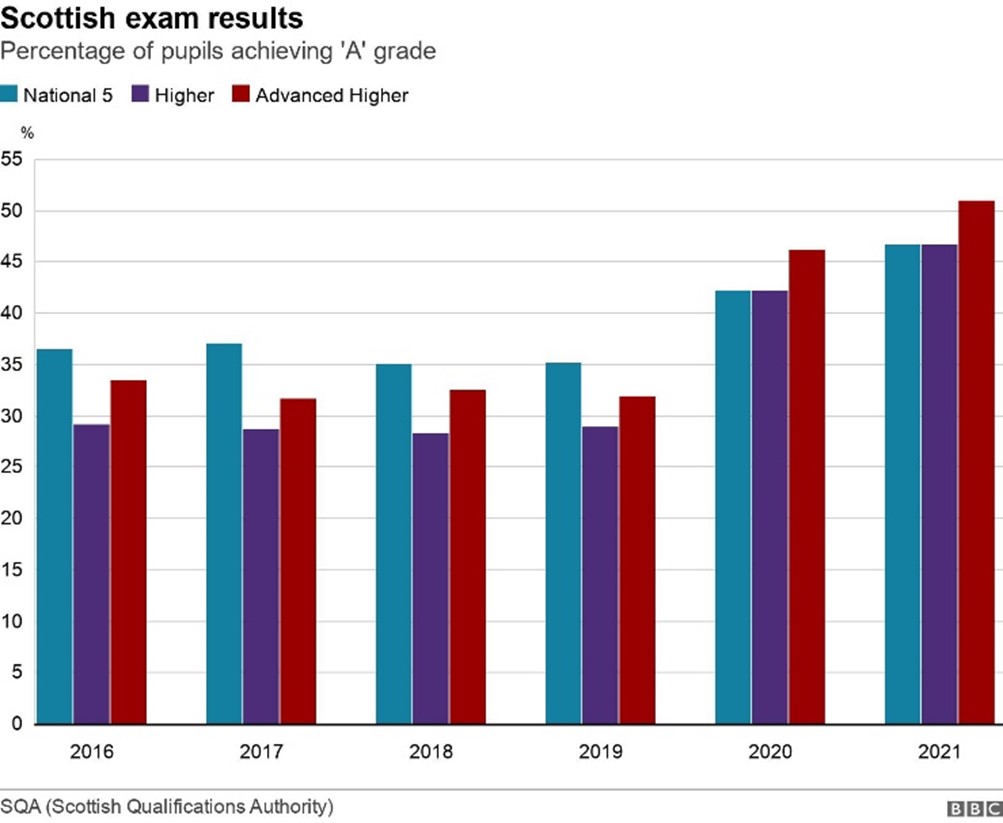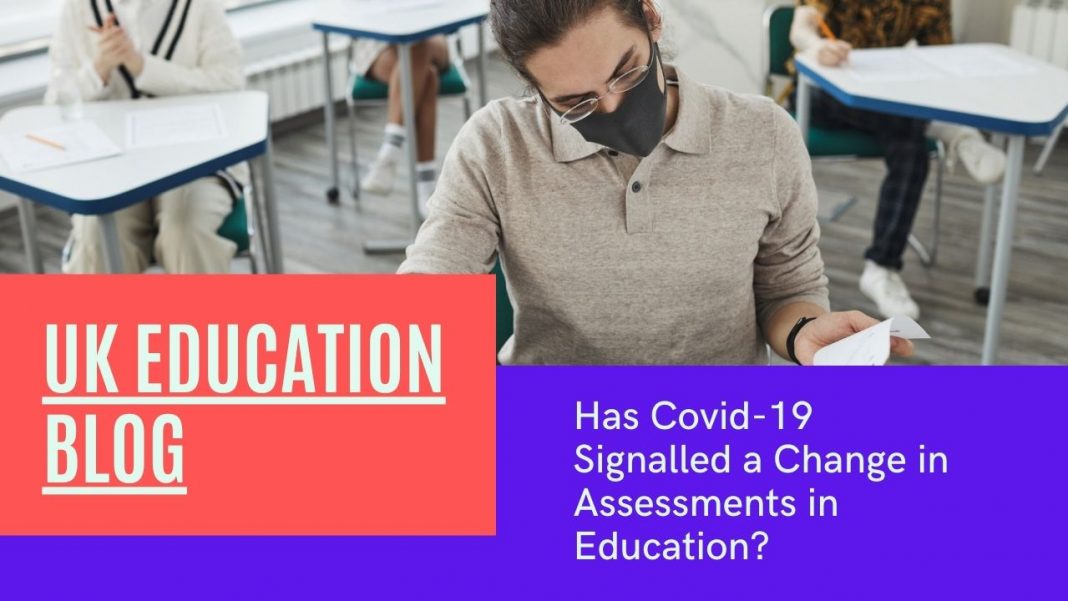2019 and 2020 saw different types of assessments and exams being cancelled for the first time ever across Scotland.
This led to a change in assessing pupil performance across the academic session. Instead of an exam as formative assessment, teachers were required to assess pupil performance with coursework submitted by pupils throughout the year.
This has caused a passionate debate concerning teacher stress, quango mismanagement, Government accountability and grade inflation. All this came at the time of the OECDs controversially delayed report into the Curriculum for Excellence (CfE), Scotland’s all-encompassing curriculum from 5-18.
This article will look at exams as a method for accountability and the possible alternative assessments to exams.
Formal Exams as a Mechanism for Accountability
Removal of formal exams is seen as a necessary step for the future of Scottish education. After league tables in Scotland were scrapped in 2002, there has been an ongoing debate, covered by the BBC News, that there are too many assessments, to maintain a perception of accountability. The only league tables available in Scotland are published by newspapers however, the Scottish Government is quick to criticise them as their only criterion is a percentage of pupils who attained 5 Highers as reported by The Times.
The Scottish Conservatives were quoted by the BBC News saying, “the best and fairest way we have to measure educational attainment”. Similarly, Dr Keir Bloomer, who led the study, said to the BBC News: “Anonymous marking is effectively insurance against the sort of rapid grade inflation that ultimately only ends when every pupil returns straight. As, which would do no favours to either individual pupils or the country as a whole”.
Indeed, grades over the past two years have risen sharply with an increase of 16.1% of pupils achieving an A grade since 2019.

Accountability is seen to be an important factor by parents to put pressure on schools to improve and for some parents is the only way they can hold their children’s teachers to account since there is no opportunity for formal feedback unless a meeting is arranged which takes time and is inconvenient for all parties involved as debated in this McCormack et. al. paper.
However, teachers feel that their ability to teach is being inhibited by satisfying performance targets at the compromise of teaching.
Teachers find themselves under increasing pressure
One teacher said, “We are put under a lot of pressure, and we are continually monitoring and assessing the children and there is a greater workload because of the paperwork that has to be filled in. As teachers you are continually under pressure to fit in all the things you must in a week and sometimes you don’t have the time. You are continually thinking I should have fitted in this particular lesson, and you are worrying about fitting everything in otherwise perhaps they won’t reach their target.” (Murphy M & Skillen P; 2015).
There are also concerns expressed from teachers that they are teaching students to pass exams rather than teaching students to learn. From personal experience, I remember vividly teachers saying, “You don’t have to understand [the topic], you just need to be able to remember it”.
This is a phrase many people will have heard and is reminiscent of a factory; teachers producing pupils on a conveyor belt to pass exams, yet this has become the accepted form of accountability as people demand value for money, especially from public sector services.
These issues call into question the philosophy of education and education under the framework of new managerialism and whether accountability should be reconsidered within the field of education.
Is there an Alternative to Exams?
 Although scrapping exams may seem attractive to pupils and markers, there are many questions surrounding alternative forms of assessment.
Although scrapping exams may seem attractive to pupils and markers, there are many questions surrounding alternative forms of assessment.
First, most OECD countries use and will continue to use external examinations to assess pupil learning and development including Finland (regarded as having one of the best education systems in the world) and New Zealand (a model OECD country for education).
They are seen to the general public to be the most objective form of assessment and mitigate potential teacher bias and have been the primary model of assessment for centuries in the UK. To attempt to shift the perception of external exams to alternative assessments may prove difficult for politicians to justify to the general public, creating political dispute and may be difficult for employers if hiring students straight from school.
What are possible alternative assessments?
The most natural one would be an extension of the current assessment
Reweighting the added value units/research projects to 50% from 30-33% seen in the social sciences and sciences. This way exams would still be in use but there would be less stress and more fairness to those who may struggle with knowledge recall and the ability to think quickly. It also allows pupils to investigate topics more in depth and create connections and develop their ability to research, analyse and synthesise.
This style of assessment is typical of universities in Scotland and would better prepare students should they wish to enter higher education. This is one of the OECD’s recommendations from their 2021 report.
The only assessment that has a 100% external examination is mathematics. This is not to say a research project could not be viable in this subject. A possible example could be to take a theory learned in the curriculum and apply it to a real-world example e.g., Pythagoras’ Theorem. This would follow the same framework as the Physics project e.g., applying Newton’s 1st law to car seat belts.
Note: Not being a teacher myself I do not know the feasibility or resources training that would be required to accomplish this.
This may however prove costly because it would require teachers to work for longer and would require more teachers to mark the exam scripts.
Would more focus on research mean less time to cover the rest of curriculum? Would this mean the curriculum focus more on depth or breadth?
These are questions that have not been fully answered by the OECD and require serious consideration.
The second and less likely option is teacher judgement
This was used during the pandemic and created much controversy and perpetuated the debate of grade inflation and legitimacy of pupil’s results, not to mention the stress which was put on teachers who had very little time to understand the new format
Either way, this does not look good for the Scottish Government. The new exam system was introduced in 2014 and has been under fire for most of those years, particularly the infamous 2015 Higher Mathematics Paper 2 (BBC News; 2015).
Now 7 years later, the OECD has proposed National 5’s (equivalent to GSCE) could be replaced with a School Graduation Certificate, meaning a pupil could go through school without sitting no formal exams.
Whatever happens, it is important not to rush into any new policy initiatives. Too often education suffers because of headlines and politician rhetoric and as a result short term policies are implemented only to be deemed unsatisfactory a few years later. A major overhaul in assessment cannot and (hopefully) won’t happen overnight because if the government doesn’t get this right, we all suffer.
Author Profile

- I am studying an MSc in Education, Public Policy and Equity at the University of Glasgow. My areas of interest are UK Education, Scottish Education, UK Education Policy and Private Schooling in the UK. I aim to become an education researcher within UK education.








